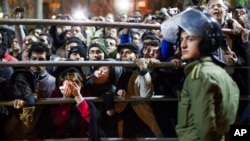Iran carried out 142 executions in May, marking the highest number of people put to death in one month in the country since 2015, a rights group said Thursday.
More than half of the executions were for drug-related crimes and the rest were given for the Islamic crimes of blasphemy, adultery and “spreading corruption on Earth,” according to the Oslo-based Iran Human Rights, or IHRNGO.
Between January and May, Iran carried out 307 executions, a number significantly higher than the 220 executions reported in the same period last year.
“The purpose of the Islamic Republic’s intensification of arbitrary executions is to spread societal fear to prevent protests and prolong its rule,” Mahmood Amiry-Moghaddam, IHRNGO director, said in a statement.
The executions have prompted calls for more international pressure on Iran to at least decelerate the current pace of capital punishments.
Last month, New York-based Human Rights Watch said, “Iranian authorities’ dramatic escalation of executions in recent weeks is a serious violation of the right to life and should bring international condemnation.”
The United Nations states that drug offenses are not among the “most serious crimes” warranting the death penalty under the International Covenant on Civil and Political Rights, to which Iran is a party.
Iran has executed 7,292 people since 2010, including 68 minors and 193 women, according to IHRNGO.
Last year, with 576 executions, Iran stood second only to China, where 883 executions were implemented, Amnesty International reported.
Minorities targeted
Of those executed in Iran last month, 30 were from the Baluch ethnic and religious minority group.
Predominately Sunnis, Iran's 2 million-strong Baluch live mostly in Sistan-Baluchistan province bordering Afghanistan and Pakistan.
In March, Amnesty International reported the execution of 14 Kurds in Iran. Iran has about 10 million Kurds, mostly based in its northwestern Kurdistan province.
For decades, Iran’s religious and ethnic minorities have demanded greater rights, equality and political representation in government, but Tehran has mostly responded with executions, prolonged detentions and other forms of state-sponsored violence, human rights groups say.
“The Iranian authorities are carrying out a horrific state-sanctioned killing spree under the guise of judicial executions. Those executed include people convicted of drug-related offenses, protesters, political dissidents and members of oppressed ethnic minorities,” Amnesty said in a statement.
Iranian authorities reject the criticisms, saying only serious crimes, as enshrined in the country’s penal code, warrant the death penalty.
“Those who should have been executed or should be executed because of their actions and crimes according to the law, their sentences will be executed or will be executed with no hesitation, indeed with full compliance with legal and justice standards,” Gholam-Hossein Mohseni Ejei, Iran’s chief of justice, was quoted by media as saying this week.





